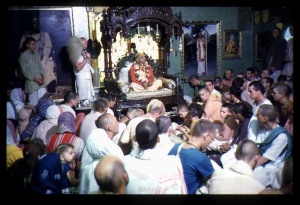CC Madhya 9.73 (1975)

A.C. Bhaktivedanta Swami Prabhupada
Below is the 1996 edition text, ready to be substituted with the 1975 one using the compile form.
TEXT 73
- śveta-varāha dekhi, tāṅre namaskari’
- pītāmbara-śiva-sthāne gelā gaurahari
SYNONYMS
śveta-varāha—the white boar incarnation; dekhi—seeing; tāṅre—unto Him; namaskari’—offering respect; pīta-ambara—dressed with yellow garments; śiva-sthāne—to the temple of Lord Śiva; gelā—went; gaurahari—Lord Śrī Caitanya Mahāprabhu.
TRANSLATION
At Vṛddhakola, Lord Śrī Caitanya Mahāprabhu visited the temple of Śveta-varāha, the white boar incarnation. After offering Him respects, the Lord visited the temple of Lord Śiva, wherein the deity is dressed with yellow garments.
PURPORT
The temple of the white boar incarnation is situated at Vṛddhakola, or Śrī Muṣṇam. The temple is made of stone and is located about one mile south of an oasis known as Balipīṭham. There is a Deity of the white boar incarnation, above whose head Śeṣa Nāga serves as an umbrella.
The temple of Lord Śiva mentioned here is situated in Pītāmbara, or Cidāmbaram, which lies twenty-six miles south of Cuddalore. The deity of Lord Śiva there is known as Ākāśaliṅga. The temple is situated on about thirty-nine acres of land, and all this land is surrounded by a wall and by a road that is about sixty feet wide.